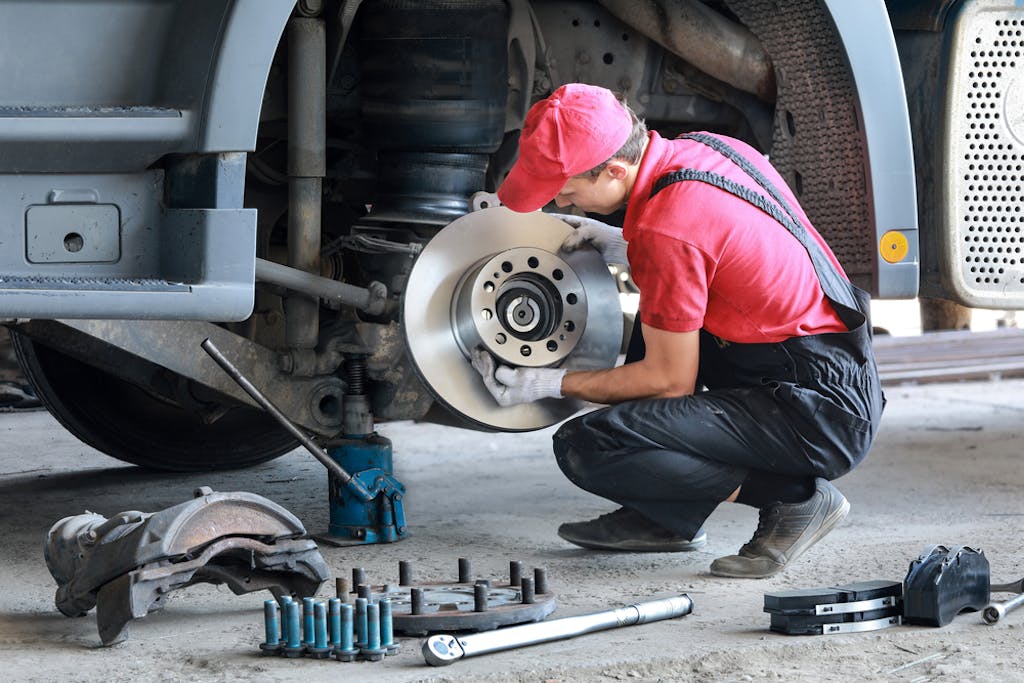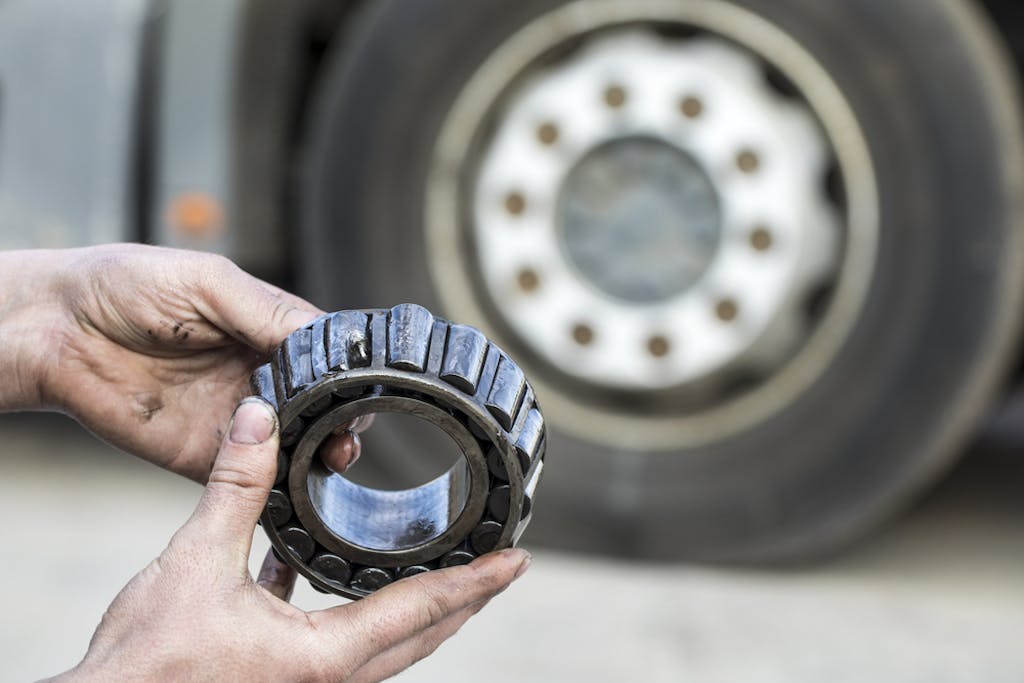Dry Van Trailer Repair & Maintenance: What Is Fixable and What Is Not
September 9th, 2019
Business owners and logistics managers know that every penny counts when it comes to profitability. In order to successfully run an operation, every expense should be carefully monitored – especially while protecting what is potentially your single, largest investment: your dry van trailer.
If you want to keep costs to a minimum, then it’s wise to routinely maintain your dry van trailer (otherwise known as a box trailer). Paying a little upfront can help you avoid steep repair jobs down the road, which not only cost an arm and a leg but can also put your trailer out of commission and your revenue stream on hold. Income dwindles, profit margins shrink, and stress levels rise, anxious to get business back to normal.
Hale Trailer Brake & Wheel, Inc. is a leading supplier of dry vans, post vans, plate vans, and more. That’s why so many of our customers turn to our knowledgeable team of experts at any of our trailer rental locations for advice on all repair and service needs. Today, we’re sharing our top tips for dry van trailer repair and maintenance so that you can keep your trailer in top shape and prevent roadside emergencies.
Dry Van Trailer Maintenance
We often say, “It’s better to be proactive than reactive.” That truth applies universally, so no matter which brand you have in your fleet, it’s important to understand the need for regular, timely tune-ups to extend the lifespan of your trailer and reduce your running cost per mile.
Schedule inspections at set intervals to detect minor problems that could later turn into large, costly repairs. Here are several points of attention you should add to your dry van trailer repair and maintenance checklist:
Oil Level and Wheel Hub

Every 1,000 miles check the oil level in the wheel hub. Also, take the time to inspect the wheel hub for any potential leaks. Oil seals vary in destination and design, so refer to the manufacturer’s manual for the proper installation and proper tool usage. If you do need to repair a dry van trailer hub, never reuse a seal to ensure leak-free operation.
Brake System
Brakes that are out-of-adjustment can cause several safety hazards including an increased stopping distance and a greater tendency for the trailer to jackknife. Therefore, establish a maintenance schedule based on experience and severity of operation (not to exceed 25,000 miles). Your preventative program should involve a periodic cleaning, inspection, adjustment, and lubrication of brake equipment such as:
- Brake shoes
- Brake shoe springs
- Brake liners
- Brake drums
- Brake adjusters
Note: Brake liners contaminated with lubricant cannot be cleaned or salvaged. They must be replaced.
Electrical System
Exposed wiring and connections can lead to corrosion and shorts causing dangerous lighting issues. Salt and brine on the roads are the most common killers for many pieces of equipment, and they often attack electrical systems quickly. To counteract the negative effects of salt and brine attacks and optimize the performance of your dry van’s electrical wiring and lamps, clean all reflective tap or devices and lamps often.
Frequently check that all lights are working properly to comply with state and federal requirements in effect. Federal Motor Vehicle Safety Standard No. 121, Air Brake Systems, was amended by the National Highway Traffic Safety Administration of DOT torequire that any truck tractors manufactured on or after March 1, 1997, provide constant power for a trailer’s antilock brake system (ABS).
Replace all burned-out lamps and any broken or missing reflective devices. If you need to repair a dry van trailer light, only use factory-approved parts.
Wheel Bearings

Adjust and lubricate bearings properly at regular intervals (depending upon the trailer speeds, loads, and general operating conditions) to maximize barring life. Remember to replace the Allen screw to prevent torque loss when adjusting the barrings and never use a hammer or chisel to remove axle nuts. You must use a torque wrench when installing new tires or adjusting wheel bearings. Failing to torque lug nuts can cause the rims to come off, which can cause serious damage. Be sure to check your lug nuts 50 miles after having them worked on.
Rims and Wheels
When performing dry van trailer repair or maintenance on the rims and wheels, watch out for these common problems during the inspection:
- Rim base cracks
- Disc failures
- Tubeless rim leak
- Stud hole cracks
- Wheel cracks
- Excessive rust or corrosion buildup
- Bent flanges, resulting from road obstructions
- Deep rim tool marks on rings or in gutter areas
- Loose, missing or damaged nuts or clamps
- Bent or stripped studs
- Damaged or missing rim drive plates
Check all metal surfaces thoroughly, including the area between duals and on the inboard side of the wheel. If you detect any of these problems, replace all damaged parts prior to reinflating the tires to the recommended air pressure. Under inflation is a tire’s greatest enemy, so verify the proper pressure before every trip or at least once per week.
Dry Van Trailer Repair Guide
By upkeeping the condition, a dry van can achieve longevity of 15-20 years or more. That said, accidents can occur, and the wear and tear caused by heavy loads may lead to the eventual degradation of certain parts. If you need help with dry van trailer repair, refer to the guide below for step-by-step instructions for repairing the walls and floor of your dry van.
For replacement parts and tools, Hale Trailer carries an extensive inventory of commercial trailer parts for sale.
Dry Van Trailer Floor Repair
Lifting and moving pallets can sometimes cause an accidental drop that cracks a floorboard, but fixing it might be easier than you think:
- Empty the trailer and inspect damage from above.
- Cross-check floor from underneath to identify any surrounding boards that may also need replacement.
- Wear a mask and use a circular saw to cut the board between cross-members.
- Lift and remove the damaged sections.
- Install a new board of proper dimensions.
- Attach the board using three screws per cross-member.
- Caulk the butt joint.
- Correctly stagger replacement boards if necessary, with a limit of one butt joint per cross-member.
Dry Van Trailer Wall Repair
Repairing a dry van panel completely is a little tricky and will probably require professional service, but you can easily fix a hole in the body of your trailer by following these steps:
- Clean the dirt and grime in the affected area with a good household cleaner.
- Remove any traces of oil with isopropyl alcohol.
- Cut the patch of aluminum equivalent to size.
- Crop every corner at a 45-degree angle to eliminate any weakness.
- Heat the surface to accelerate binding.
- For extra support, insert a block of styrofoam at an appropriate thickness between the inner wall and aluminum patch.
- If a complete seal is not obtained, apply a sealant.
Dry Van Trailer Service
If you’re attempting to fix a problem apart from slight structural damage, chances are that you’ll probably want to have the faulty part professionally replaced or repaired. Placing your service into the hands of a pro will better your odds of the job performed correctly the first time, rather than causing more headaches down the road. Some examples of dry van trailer repairs that you likely cannot fix yourself include:
- Suspension overhauls and rebuilds
- Gearwork, including rebuilds
- Roof repair & replacement
- Van bottom rail repair & replacement
- Swing and roll door repair & replacement
- Driveline repairs
- Liftgate repair & installation
- Pintle hook installation
- Laser axle alignments
- Welding & fabricating
- Clutches
- Water pumps
- Fuel pumps
- Hose/belt replacements
- Wreck repair
Final Tips on Dry Van Trailer Repair and Maintenance
No matter what industry you’re in – food and beverage, agriculture, oil, gas, logistics, and so forth – your trailers are the backbone of your business and are critical for transporting products from A to B. Even if one dry van in your entire fleet is down, you could potentially lose out on thousands of dollars of revenue during the time it’s being repaired.
Create a preventative maintenance plan to ensure your trailer stays in the best condition possible and stretches every dollar you purchased it for. If you ever do need to go forward with repair work, keep in mind that Hale Trailer also offers dry vans for rent so that your business never has to slow down while your primary trailer is being serviced. When repairs can’t be fixed and it the time comes to make another investment, know that you can find high-quality, new or used dry van trailers for sale from Hale Trailer Brake & Wheel, Inc.
We’ve been in business for decades and have you covered for all your trailer equipment needs at an unbeatable price. You can count on each of our models to be in excellent condition and properly maintained. Our knowledgeable team is your go-to source for trusted information on dry van trailer repair and maintenance, so the next time you have a question, don’t hesitate to contact us.
All the information on this website – https://www.haletrailer.com – is published in good faith and for general information purposes only. Hale Trailer Brake and Wheel does not make any warranties about the completeness, reliability and accuracy of this information. Any action you take upon the information you find on this website, is strictly at your own risk. Hale Trailer Brake and Wheel will not be liable for any losses and/or damages in connection with the use of our website.
